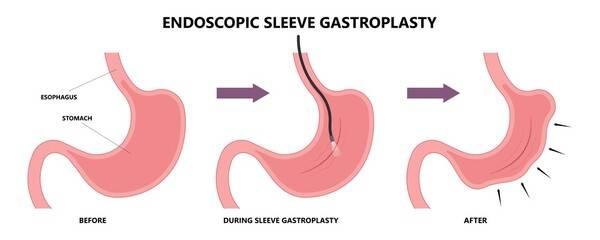No Products in the Cart

ESG, also known as....
Endoscopic sleeve gastroplasty is a non-surgical weight loss procedure aimed to decrease the size of the stomach to foster weight loss. It essentially decreases gastric volume and adjusts gastric motility by inserting sutures along the gastric body to give the stomach a sleeve-like composition. In other words, using an endoscope through the mouth and into the stomach, a suturing device is attached and works to place small folds into the stomach to decrease its size.
As a result, there’s less space in the stomach for food, which means less ghrelin (hunger causing hormone) secreted, and therefore individuals feel full faster. ESG Weight Loss Treatment is typically available to individuals with a BMI of 30 and above who prefer traditional bariatric surgery or fail to maintain weight loss with lifestyle modifications alone. Patients who carried around 100 pounds of extra weight were able to drop almost half of that weight within the first year after their surgery.
“Research shows that if you keep weight off for an extended period, you’re more likely to keep it off permanently...”

However, like other weight loss procedures, ESG requires long term healthy lifestyle changes such as a healthy diet and regular exercise to guarantee the success of the procedure.
For example, individuals who received ESG and made lifestyle changes lost 15-20% of their total body weight over a two-year period. Along with helping with weight loss, ESG also reduces risk for hypertension, diabetes, and hypertriglyceridemia. Reduction in comorbidities highlight the fact that ESG may have an effect on long term health outcomes. For example, because many individuals have additional health complications linked to obesity, undergoing the procedure can improve and even eliminate some problems. These include, risk of heart disease or stroke, osteoarthritis, sleep apnea, gastro reflux disease, etc. As with side effects, studies have shown that abdominal pain, nausea, and vomiting that occur immediately after the procedure, essentially improves after a few days thus there are minimal long term side effects.
References
https://www.ncbi.nlm.nih.gov/pmc/articles/PMC5424680/
Personalized Approach for Obese Patients Undergoing Endoscopic Sleeve Gastroplasty - PMC (nih.gov)
When compared to a similar alternative procedure, LSG, (Laparoscopic sleeve gastrectomy), ESG has a significantly lower incidence of bleeding occurrences and gastroesophageal reflux disease (GERD), proving its higher safety profile than LSG. Following the procedure, individuals are told to follow an all-liquid meal plan for at least two weeks before transitioning into a soft food plan and then to regular eating. Therefore, the first month after the outpatient procedure is the period patients lose the most weight because of the restriction of solid foods. Previous studies have also shown that ESG is effective for up to 5 years after the procedure, and its long-term impact is ideal for maintaining weight loss. Normally, typical patients lose about 10% of their total body weight during the 3 months following the procedure but, this can progress up to 10-13% over the following 9 months. When observed within a larger time span, many patients were able to lose 70% of their excess body weight because of how ESG helps change overall eating habits, such as eating smaller portions. Although ESG has proven to be an effective weight loss option. the amount of weight each individual loses after ESG ultimately depends on how closely they follow the guidelines provided to them by their doctor.